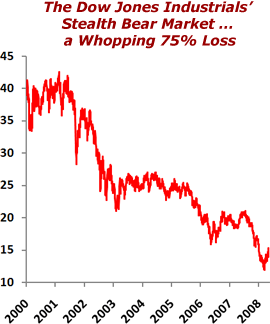The Stocks Stealth Bear Market
Stock-Markets / Stocks Bear Market May 22, 2008 - 07:51 AM GMT
 Last year, when the Dow was hovering near its all-time high of 14,198, I issued my forecast that the next big move in the stock market would be a sharp decline to 11,600.
Last year, when the Dow was hovering near its all-time high of 14,198, I issued my forecast that the next big move in the stock market would be a sharp decline to 11,600.
On January 22 of this year, the Dow hit 11,634.82. Since then, it's been seesawing up and down, gyrating wildly, yet with an upward bias, reaching as high as 13,136.69 on May 19.
What gives with the Dow Jones Industrial Average? How about the S&P 500? And the Nasdaq?
Where are these indexes headed? With all the terrible news on the U.S. economy, why hasn't Wall Street crashed in one giant bear market? Could it be that rather than falling out of bed, stocks are actually entering a new bull market?
If you've been asking yourself questions like these, you're not alone. Virtually every investor in the U.S. is asking the same ones.
In this issue of Money and Markets , I'll give you my answers and more.
But before I get started, let me lay down one crucial law of today's economies and asset prices that you must keep in the forefront of your mind ...
All asset prices fluctuate between two extremes — periods when their prices are below inflation-adjusted levels, and periods when they exceed their inflation-adjusted prices.
Put another way, all assets eventually seek out their inflation-adjusted real price, no matter what.
 |
| In sharp contrast to the protracted slump in the U.S. stock markets, commodities are exploding. |
For instance, in the 1980s and '90s, when investors worldwide became enamored with the stock markets, the prices of natural resources and commodities fell way below their inflation-adjusted prices, in many cases back to prices not seen since the Great Depression.
Then, when the stock market bubble burst, commodity prices sprung to life — via a host of catalysts — and are now playing catch-up with inflation, and the plunging purchasing power of the dollar. Examples ...
Oil, which once traded as low as $10 a barrel in the late 1990s, has now caught up to — and exceeded — its inflation-adjusted price of about $110 per barrel.
Wheat, trading in the late 90s as low as its 1932 Great Depression price, has now rocketed to new all-time record highs, catching up with inflation, and exceeding it by a wide margin.
The same can be said for many other commodities, all of which were beaten down as stocks became the investment of choice in the '80s and '90s.
Even real estate prices failed to keep up with inflation in the 1990s. They only sprang into action after stocks had peaked in 2000. We all know what happened afterward. Real estate prices went up so much, so fast, that they rapidly became overpriced in terms of inflation, and hence, a bubble formed.
My point: It's crucial to understand that asset classes almost always return to their inflation-adjusted prices after they have fallen out of favor.
Now, listen carefully, because what you're about to hear will most likely not be found anywhere else ...
U.S. Stocks Have Been in a Giant Stealth Bear Market Since the Year 2000!
U.S. stock markets have been losing massive ground to inflation, and as a result they have been in one giant stealth bear market since the year 2000. By my calculations, they have already lost 75% of their value , making the period from 2000 to 2008 one of the worst bear markets for U.S stocks on record, ever!
How can that be, you ask? After all, the Dow Jones Industrial Average is trading around the 13,000 level, roughly 1,000 points shy of its record high.
The answer lies not in the nominal price of the DJIA, but in the prices of everything outside the DJIA — everything from the price of oil ... to gas ... to gold ... to other natural resources ... and even to real estate prices.
Summed up, because the prices of all those other asset classes have gone up so much in so little time, the DJIA at 13,000 buys as little as 75% of what it did just eight years ago.
Look at it this way: On January 14, 2000, the DJIA stood at 11,750.28. If you had invested $11,749 in the Dow back then, you could have bought 41 ounces of gold ... 462 barrels of oil ... 134 pounds of copper ... or 8.4% of the median single family home in the U.S.
Fast forward to May 2008. The Dow has risen 10.2% to almost 13,000. But even at that level, it would only purchase:

![]() 105 barrels of oil — 77% less than it did in the year 2000 ...
105 barrels of oil — 77% less than it did in the year 2000 ...
![]() 14.38 ounces of gold — 65% less than it did in 2000 ...
14.38 ounces of gold — 65% less than it did in 2000 ...
![]() 74% less copper than it did in 2000 ...
74% less copper than it did in 2000 ...
![]() And even when it comes to the now slumping real estate market, the DJIA buys the equivalent of only 6.5% — almost 23% less — of the nation's median single family home than it did just eight years ago.
And even when it comes to the now slumping real estate market, the DJIA buys the equivalent of only 6.5% — almost 23% less — of the nation's median single family home than it did just eight years ago.
All told, in terms of gold — REAL MONEY — the DJIA has already lost as much as 77% of its purchasing power in just the last eight years. The same can be said of the S&P 500 and the Nasdaq.
Now do you understand why I say that U.S. stock markets have been in an eight-year long giant stealth bear market?
And why is this so important? Because ...
When investors perceive stocks as an inflation hedge — especially in terms of rising asset values — that can drive share prices significantly higher, even giving a boost to the Dow.
But because with the U.S. economy so sluggish, it's highly unlikely that the majority of U.S. stocks can outperform investments that are unencumbered by sluggish or falling earnings.
Never forget the dangers:
First, the dollar continues to fall, stoking inflation higher — and simultaneously frightening savvy foreign investors to move away from U.S. stocks.
Second, the Fed may have temporarily patched up the mortgage and credit crisis. But the credit crisis is far from over. More bank write-offs and losses are coming.
Third, corporate earnings in the U.S. are getting pinched by inflation. And while many companies are starting to raise prices to pass their increased raw materials costs on, consumers are pulling in their horns and slamming their wallets shut. So I don't think corporate earnings can grow at the rates needed to boost the stock market anything more than for a temporary rally.
So Make No Mistake About It: Commodities and Natural Resource Stocks Will Still Remain in Powerful Long-term Bull Markets
Even if stocks were to take off to the upside, the commodity markets are truly in a new paradigm: Never before have they been caught in a perfect storm of exploding demand (from three billion new capitalists in Asia) ... severely limited supplies (from years of neglect when they underperformed the rate of inflation) ... and central bankers who are determined to avoid even the slightest whiff of deflation by printing money and credit like there's no tomorrow.
Best wishes,
Larry
P.S. To be sure you don't miss any of my upcoming signals and my specific picks to profit from the next phase of the rally in natural resources — oil just hit $132 a barrel! — subscribe to Real Wealth now . It's only $99 a year for 12 issues, urgent flash alerts whenever warranted, and more. Click here for more information.
This investment news is brought to you by Money and Markets . Money and Markets is a free daily investment newsletter from Martin D. Weiss and Weiss Research analysts offering the latest investing news and financial insights for the stock market, including tips and advice on investing in gold, energy and oil. Dr. Weiss is a leader in the fields of investing, interest rates, financial safety and economic forecasting. To view archives or subscribe, visit http://www.moneyandmarkets.com .
Money and Markets Archive |
© 2005-2022 http://www.MarketOracle.co.uk - The Market Oracle is a FREE Daily Financial Markets Analysis & Forecasting online publication.



